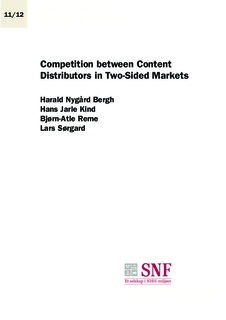Competition between content distributors in two-sided markets
Working paper

Åpne
Permanent lenke
http://hdl.handle.net/11250/166804Utgivelsesdato
2012-05Metadata
Vis full innførselSamlinger
- Working papers (SNF) [809]
Sammendrag
We analyze strategic interactions between two competing distributors of an independent TV channel. Consistent with most of the relevant markets, we assume that the distributors set end-user prices while the TV channel sets advertising prices. Within this framework we show that the distributors have incentives to internalize the fact that viewers dislike ads on TV, but no incentives to internalize how the TV channel’s profits from the advertising market are affected by end-user prices. This leads to some surprising results. First, we show that even undifferentiated distributors might make positive profits. Second, a TV channel might find it optimal to commit to not raising advertising revenue. Third, regulation of the advertising volume might be welfare improving even if the unregulated advertising level is too low from a social point of view.